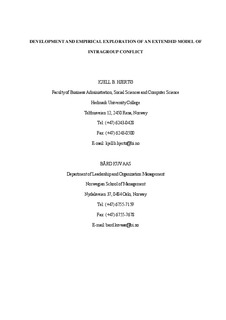| dc.contributor.author | Hjertø, Kjell B. | |
| dc.contributor.author | Kuvaas, Bård | |
| dc.date.accessioned | 2010-03-24T12:48:15Z | |
| dc.date.issued | 2009 | |
| dc.identifier.citation | Hjertø, K.B., Kuvaas, B. (2009). Development and empirical exploration of an extended model of intragroup conflict. International Journal of Conflict Management (20)1, 4-30 | en |
| dc.identifier.uri | http://hdl.handle.net/11250/134198 | |
| dc.description | Dette er post-print av artikkelen publisert i
International Journal of Conflict Management | en |
| dc.description.abstract | Purpose - The purpose of this study was to develop and empirically explore a model of four intragroup
conflict types (the 4IC model), consisting of an emotional person, a cognitive task, an emotional task, and
a cognitive person conflict. The two first conflict types are similar to existing conceptualizations, whereas
the two latter represent new dimensions of group conflict.
Design/methodology/approach - Based upon a heuristic distinction between cognition and emotion, the
four conflict types are defined, and scales for measuring them are developed. The psychometric and
statistical properties of the scales were analyzed by data collected from four company samples and two
student samples (N = 208). The validity of the constructs was evaluated by comparing them with similar
constructs, in particular, the Intragroup Conflict Scale (ICS), developed by Jehn (1995).
Findings - A theory driven exploratory factor analysis elicited a 19-item structure of four reliable factors,
representing the four conflict types. A confirmatory factor analysis demonstrated satisfactory properties of
the data matrix compared with the proposed model. Furthermore, a refined 12-item scale was developed
to consider the validity of the 4IC, with reasonably satisfactory findings.
Research limitations/implications - Limitations concerning sample size, wording of items, the
demarcation between conflict types and conflict approaches, and the robustness of the constructs are
discussed. We suggest that researchers may find the model useful for future studies of conflict in groups.
Practical implications - Our model may be of assistance in handling conflicts in organizations. In
particular, managers and employees may become aware that emotional conflicts are not always associated
with relational or person oriented issues; they may as well concern task oriented issues. Furthermore,
cognitive conflicts do not always have to be task oriented; they may also concern relational or person
oriented issues. The introduction of the emotional task oriented and the cognitive person oriented conflict
types may thus extend the conflict management tool box for managers and employees.
Originality/value - The results of this study challenge common use of emotional and relationship/person
conflicts as interchangeable conflict types, and cognitive and task conflict as interchangeable conflict
types. Accordingly, the study suggests new ways to understand conflicts in groups. | en |
| dc.format.extent | 245614 bytes | |
| dc.format.mimetype | application/pdf | |
| dc.language.iso | eng | en |
| dc.publisher | Emerald Group Publishing Limited | en |
| dc.relation.uri | http://www.emeraldinsight.com/Insight/viewContentItem.do;jsessionid=76DFA71FA6D58E33B5E3F0C65EF16D47?contentType=Article&hdAction=lnkpdf&contentId=1771226&history=true | |
| dc.subject | Intragroup conflict | en |
| dc.subject | emotion | en |
| dc.subject | cognition | en |
| dc.subject | konflikter | en |
| dc.title | Development and empirical exploration of an extended model of intragroup conflict | en |
| dc.type | Journal article | en |
| dc.type | Peer reviewed | |
| dc.subject.nsi | VDP::Social science: 200::Psychology: 260::Cognitive psychology: 267 | en |
| dc.subject.nsi | VDP::Social science: 200::Sociology: 220 | en |
| dc.source.pagenumber | 4-30 | en |
| dc.source.volume | 20 | en |
| dc.source.journal | International Journal of Conflict Management | en |
| dc.source.issue | 1 | en |
